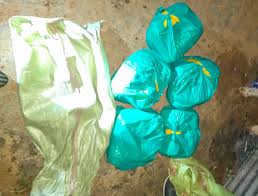Police officers in Busia County have arrested a man suspected of transporting ten bales of cannabis sativa (bhang) weighing 10 kilograms with an estimated value of Ksh.300,000.
According to a statement released by the National Police Service (NPS), the officers based at the Busia Police Station received a tip-off concerning the drugs.
They intercepted a bus destined for Nairobi at the Suo roadblock along the Busia-Kisumu highway.
“He was escorted to the station and placed in custody, awaiting arraignment in court,” NPS stated in the statement.
“The National Police Service commends the swift and coordinated efforts of the officers involved in the operation and reiterates its full commitment to the ongoing fight against drug trafficking.” By Jelilah Daud, Citizen Digital






